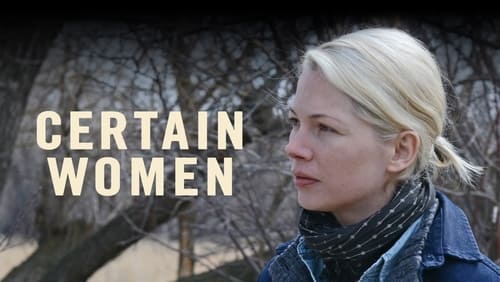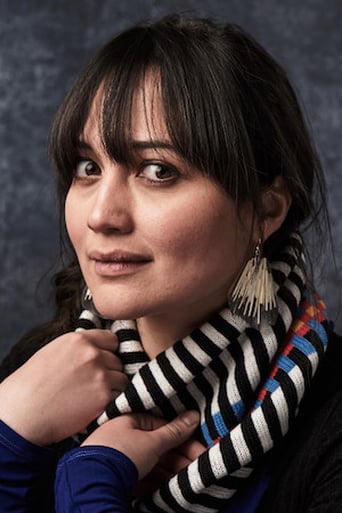joelashley-704-631621
This movie's meaning totally escaped us. There appears to be 3 somehow related "plots", but none are decipherable much less the overall meaning the writers were trying to convey. We both dozed at various points, the wife in fact snoozed the last 20 minutes ... we'll, she didn't actually miss much. The acting was okay, except for the super long, drug-out scenes of a lone actor just staring, or endless facial shots of someone driving. What possible life-changing enlightenment is one supposed to derive from that is beyond me, but today's directors and editors seem to think they are adroitly hitting us with ploys as ingenious as Hitchcock or Ford. Not.
lasttimeisaw
Carving out a sublimely low-key triptych out of Maile Meloy's stories onto the screen, Kelly Reichardt's lucidly orchestrated CERTAIN WOMEN whisks her audience to a small-town Montana, and in each part of the triptych, a woman finds herself flummoxed by a common-or-garden quagmire about human interaction (by turns, professionally, domestically and emotionally) which soberly flouts any sensationalism through Reichardt's brilliant execution. Laura Wells (a pensive and discomfited Dern), a middle-aged lawyer, is frustrated by the persistent visits of her client William Fuller (Harris, strives for an ostensibly expansive persona but strikingly betrays his disquiet bobbing right underneath the surface), who insists on suing his company for the work-place injury inflicted on him, even after Laura repeatedly explicates to him that it is legally nugatory reckoning with his circumstance, still he won't take her advise seriously, not until he implicates her into a late-night hostage foolery, the episode finds an almost anticlimactic pay-off. The heroine in the second segment is Gina (Williams, exquisitely smoldering in her understated flair), who is married to Ryan Lewis (Le Gros), and they have a teenage daughter Guthrie (Rodier), their marital rift starts to aggravate when they visit an elderly friend Albert (Auberjonois) to buy a heap of sandstone lined up haphazardly in front of the latter's house, which they can use to build their own abode. If Laura's plight is occasioned by exterior intrusion and social prejudice (people tend to believe an authoritative male figure than a female one), Gina's story tackles a more internal frustration within a nuclear family, stranded inside a loveless marriage (right out of the box, Reichardt notifies us Ryan is Laura's part-time lover), Gina seems to have an upper hand over a biddable Ryan and in negotiating with Albert for their house's sake, but Reichardt's observant camera brings home to audience that she is also invidiously victimized or undermined by the male parties here, not to mention being given the short shrift from the pubescent Guthrie. A scathing but tonally placid critique about motherhood, wifehood and being a strong woman allocates the second chapter ample elbow room (for both Gina and spectators) to breathe and introspect.Yet, a crescendo is crystallized in the third story, about a young girl, simply credited as the Rancher (Gladstone), whose Indian descent is only hinted, takes a horse-tending job on her ownsome, seeks any ghost of human contact out of her monotonous solitude, she stumbles on a night class of school law taught by a young lawyer Beth Travis (Stewart), who has to inure a four-hour drive (one way) for this biweekly endeavor. An unilateral attraction germinates in hugger-mugger, so how far does one can go to venture a possible reciprocation? Most of the time, the answer is always there, clear as day, but no one can blame you for trying, the newcomer Gladstone kills it in her transcendent reaction shots in response of a bewildering nonevent, brimful of subtlety and unfeigned undertow of heart-breaking, meanwhile Stewart brings about a significant mien of jaded weariness and guarded spontaneity as a wrong-footed, short-changed bottom feeder.
Opting for a less elaborately interwoven structure, Reichardt allows each story flourish on its own terms without much fragmentation, and only tentatively suggests the characters' tie-ins (Laura and Gina is obliquely linked by Ryan, the Rancher and Laura has a fleeting encounter in her office, that is all), and most extraordinarily furnishes these heartfelt female-centered stories with an incisive contemporary spin meanwhile upholds her aesthetic integrity to the hilt, CERTAIN WOMEN is a microcosmic film-making in its most auteurist stature.
ragboutique
What a sleeper of a movie. The characters weren't even interesting. However, I kept watching because it has great reviews, so I was sure there was going to be some climax and/or crazy way the characters lives "intersected" (as the summary described). I truly don't even know what to say about this movie except I'm a bit ticked and I want my 2 hours back. (But if you're still intrigued and want to watch, I'll give you this hint: what you see in the first 5 minutes is what you'll get for the other 142 minutes.)











